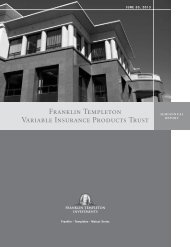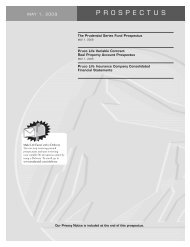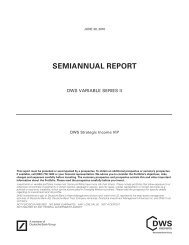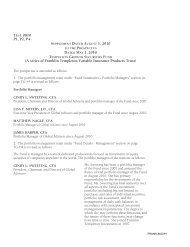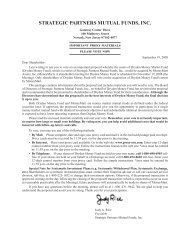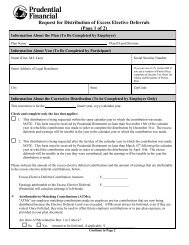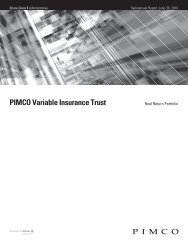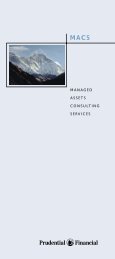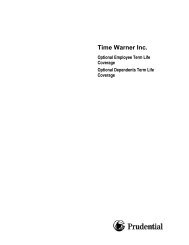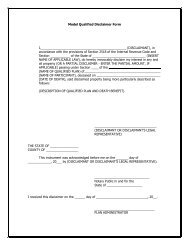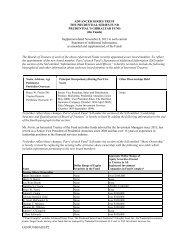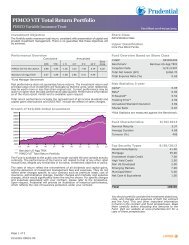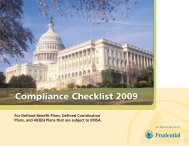Financial Experience & Behaviors Among Women - Prudential
Financial Experience & Behaviors Among Women - Prudential
Financial Experience & Behaviors Among Women - Prudential
You also want an ePaper? Increase the reach of your titles
YUMPU automatically turns print PDFs into web optimized ePapers that Google loves.
<strong>Financial</strong> <strong>Experience</strong> &<br />
<strong>Behaviors</strong> <strong>Among</strong> <strong>Women</strong><br />
2010−2011 <strong>Prudential</strong> Research Study<br />
TENTH ANNIVERSARY<br />
E D I T I O N<br />
A report prepared by <strong>Prudential</strong> Research<br />
0182849-00001-00
Acknowledgment<br />
A Decade of Progress<br />
Many lessons are coming out of the financial crisis, but one seems to stand out from<br />
the rest: The need for active financial planning has never been greater. And women<br />
are heeding the call.<br />
For 10 years, we’ve been studying women’s financial experience and behaviors. Why?<br />
Because women are key decision-makers and caregivers in their households. We’ve seen<br />
steady progress in women becoming more aware, engaged, and actively involved in their<br />
finances. According to this year’s study, 95 percent of women are financial decisionmakers,<br />
and 84 percent of married women are either solely or jointly responsible for<br />
household financial decisions. In fact, they are often the primary decision-maker about<br />
finances. The decisions they make are at the heart of determining their long-term<br />
financial security, as well as that of their families.<br />
<strong>Women</strong> are optimistic about the nation’s economic recovery and have some degree of<br />
confidence they will achieve their financial goals, although they recognize they may need<br />
to work longer than anticipated. Although many women still do not have financial plans<br />
in place to achieve their goals, events of the last two years have clearly been a learning<br />
experience. <strong>Women</strong> are planning to exercise greater caution and control over their<br />
finances as they look to the future.<br />
On this 10th anniversary of <strong>Prudential</strong>’s landmark study on the <strong>Financial</strong> <strong>Experience</strong> &<br />
<strong>Behaviors</strong> <strong>Among</strong> <strong>Women</strong>, we celebrate a decade of progress and empowerment. While<br />
gaps in knowledge and confidence remain, women recognize these challenges and are<br />
focused on achieving financial success. The financial services industry will need to<br />
continue to evolve to meet women’s changing needs, and to support their financial<br />
education. We aim to be at the forefront of these changes, and remain committed to<br />
inspiring confidence in women and supporting them on their financial journey.<br />
Learn more. Visit www.prudential.com/women<br />
Christine Marcks<br />
Lori High<br />
Judy Rice<br />
President<br />
<strong>Prudential</strong> Retirement<br />
President<br />
<strong>Prudential</strong> Group Insurance<br />
President<br />
<strong>Prudential</strong> Investments<br />
2 <strong>Prudential</strong> <strong>Financial</strong>
About the Study<br />
Tenth Anniversary Study<br />
This study, <strong>Financial</strong> <strong>Experience</strong> & <strong>Behaviors</strong> <strong>Among</strong><br />
<strong>Women</strong>, looks at the current landscape of women’s<br />
financial security and preparedness, and identifies the<br />
progress women have made as well as some of the<br />
challenges they continue to face in achieving their<br />
financial goals.<br />
The study was launched in 2000, and since then<br />
has been updated every two years.<br />
Methodology<br />
This year, the <strong>Prudential</strong> <strong>Financial</strong> study on the<br />
<strong>Financial</strong> <strong>Experience</strong> & <strong>Behaviors</strong> <strong>Among</strong> <strong>Women</strong><br />
polled 1,250 American women about their financial<br />
knowledge, actions taken, and confidence in attaining<br />
their financial goals. The survey was administered from<br />
Feb. 10-26, 2010. The margin of error is ±2.9% at a<br />
95% confidence level.<br />
Respondents are panelists in the Harris Interactive Poll<br />
Online. Study participants were a national sample of<br />
female sole and joint heads of households between the<br />
ages of 25 and 64, with a 2009 household income of<br />
$50,000 or more.<br />
2010 <strong>Women</strong> Respondents<br />
Age<br />
Household Income<br />
Investable Assets<br />
21%<br />
25-34<br />
22%<br />
55-64<br />
22%<br />
35-44 35%<br />
45-54<br />
40%<br />
$50,000 to<br />
$74,999<br />
22%<br />
$75,000<br />
to $99,999<br />
38%<br />
$100,000 +<br />
28%<br />
Under<br />
$50,000<br />
22%<br />
$50,000 to<br />
$99,999<br />
26%<br />
$250,000 +<br />
24%<br />
$100,000 to<br />
$249,999<br />
Employment Status Education Children<br />
7% Retired<br />
3% Unemployed<br />
7%<br />
Self-employed<br />
22%<br />
Homemaker<br />
13%<br />
Part-time<br />
48%<br />
Full-time<br />
26%<br />
High School<br />
or Less<br />
13%<br />
Graduate<br />
School<br />
61%<br />
College<br />
26%<br />
Yes, Not<br />
at home<br />
12%<br />
None<br />
62%<br />
Yes, Still<br />
at home<br />
<strong>Financial</strong> <strong>Experience</strong> & <strong>Behaviors</strong> <strong>Among</strong> <strong>Women</strong> 3
Overview<br />
The 10th anniversary edition of <strong>Prudential</strong>’s <strong>Financial</strong><br />
<strong>Experience</strong> & <strong>Behaviors</strong> <strong>Among</strong> <strong>Women</strong> shares some<br />
common themes with earlier waves of the study, and<br />
also reveals some interesting new trends and<br />
opportunities, including:<br />
• <strong>Women</strong> are more involved than ever in their<br />
households’ investment and financial decisionmaking.<br />
• The economic crisis has heightened women’s<br />
recognition of the need to develop a financial plan<br />
that will meet long-term financial goals.<br />
• <strong>Women</strong> are not confident about making financial<br />
decisions, and do not fully understand many of the<br />
increasingly sophisticated financial products that<br />
are available.<br />
• However, women are optimistic about the future and<br />
have a strong desire for financial education and<br />
guidance.<br />
Although most financial decisions are a shared<br />
responsibility, one-quarter of women surveyed are the<br />
primary financial decision-makers in their households.<br />
• Nearly seven in 10 of those surveyed are employed,<br />
and nearly three-fourths have college degrees or<br />
higher, with savings and assets of $100K or more.<br />
• A full 95% indicate that they are directly involved in<br />
their households’ financial decision-making; 25% are<br />
the primary decision-makers. Eighty-four percent of<br />
married women say they are involved in financial and<br />
retirement planning and, of these, 15% have sole<br />
responsibility.<br />
Despite the financial setbacks of the economic<br />
crisis and concern about continued volatility, more<br />
than half remain optimistic about the country’s<br />
economic recovery.<br />
• This optimism is also reflected in women’s evaluation<br />
of their own circumstances.<br />
• Although a majority of women (55%) now believe<br />
that they will need to work longer than they expected,<br />
and, as a result, postpone their retirement, threefourths<br />
believe that they are financially on track to<br />
meet their long-term goals, or are well-positioned<br />
to catch up.<br />
Many women still lack confidence in their ability to<br />
make sound financial decisions, and lack knowledge<br />
about sophisticated financial products.<br />
• Fewer than two in 10 women feel “very prepared”<br />
to make wise financial decisions. Half indicate that<br />
they “need some help,” and one-third feel that they<br />
“need a lot of help.”<br />
• Nearly nine in 10 of those who are looking for a<br />
lot of help need guidance on how to choose financial<br />
products that meet their needs. They say their<br />
knowledge of annuities, mutual funds, and individual<br />
securities is limited.<br />
Just one-third of women have a detailed financial plan<br />
in place, and, among the youngest segment (ages<br />
25-34), just one in 10 has a financial plan in place.<br />
• Barriers to developing a detailed financial plan<br />
include lack of time, the pull to meet shorter-term<br />
financial obligations, lack of knowledge, and for<br />
many, an unmet desire for assistance and help.<br />
More than half of those surveyed are very willing to<br />
have retirement planning decisions made by others.<br />
• This wish is often complicated by a lack of trust,<br />
as only 19% are very comfortable letting a financial<br />
professional lead their financial planning.<br />
• Over six in 10 rely on family and friends, rather than<br />
financial professionals, for investment information.<br />
• Yet those who currently use financial advisors are<br />
more likely to feel that they are financially on track<br />
than those who go it alone.<br />
The financial crisis created a wake-up call. The need<br />
for a trusted financial partner has never been greater.<br />
• <strong>Women</strong> are looking for help in preparing for a<br />
secure future.<br />
• <strong>Financial</strong> firms and advisors must redouble their<br />
efforts to build trust, and be prepared to address<br />
sensitive family issues such as the need for assisted<br />
living care.<br />
4 <strong>Prudential</strong> <strong>Financial</strong>
During the Last Decade, <strong>Women</strong> Have Become<br />
More Involved in <strong>Financial</strong> Issues<br />
There is Optimism<br />
While women remain concerned about the economy<br />
and market volatility, they are optimistic about the<br />
economic outlook. They are realistic that they may<br />
have to retire later than planned, although many<br />
unrealistically believe that they can rely on Social<br />
Security to meet their retirement needs.<br />
While women understand the importance of preparing for<br />
the future, few have a financial plan in place to do so.<br />
<strong>Women</strong> are Decision-Makers<br />
Survey respondents are highly educated, typically<br />
employed, and three-fourths have savings and assets<br />
of $100K or more. <strong>Among</strong> the total population, 95%<br />
of women are involved in financial decision-making<br />
in their households, and one-fourth are the primary<br />
decision-makers.<br />
Married women play a key role in the financial<br />
decisions of their households as well. While most<br />
decisions are made jointly, 84% say they are involved<br />
in their household’s financial decisions. Fifteen percent<br />
of married women have sole responsibility for these<br />
decisions.<br />
Impact of Market Crisis<br />
Concern about U.S. economic volatility<br />
6%<br />
Not<br />
Key Characteristics of <strong>Women</strong> Today*<br />
68% Employed<br />
74% Education College +<br />
74% Savings and Assets $100,000 +<br />
45%<br />
Somewhat<br />
49%<br />
Very<br />
94%<br />
concerned<br />
Optimistic outlook about<br />
economic recovery<br />
55%<br />
optimistic<br />
45%<br />
Not /Unsure<br />
11%<br />
Very<br />
44%<br />
Somewhat<br />
95% 25%<br />
<strong>Financial</strong><br />
decisionmakers<br />
Primary<br />
decisionmakers<br />
84% 15%<br />
Married women<br />
involved in<br />
household<br />
financial<br />
decisions<br />
*Base: Household income of $50,000 or more.<br />
Married<br />
women who<br />
are sole<br />
decisionmakers<br />
<strong>Financial</strong> <strong>Experience</strong> & <strong>Behaviors</strong> <strong>Among</strong> <strong>Women</strong> 5
Those Who are <strong>Financial</strong>ly Prepared are Most on Track<br />
<strong>Financial</strong> Confidence is Based on Knowledge<br />
Very few women feel “very prepared” to make wise<br />
financial decisions. The most prepared women are the<br />
most on track to reach their retirement goals, protect<br />
their assets, and generate future income.<br />
This “very prepared” group is also most likely to have<br />
an advisor (53%) and to understand complex financial<br />
products like annuities (68%).<br />
Half of the women surveyed say they “need some<br />
help.” These women are on the right track and know<br />
how to protect their investments from losses (65%).<br />
Many in this group use a financial advisor. More than<br />
a quarter of this group feel they aren’t saving enough<br />
for retirement.<br />
Prepared to Make Wise<br />
<strong>Financial</strong> Decisions<br />
(All respondents)<br />
32%<br />
Need a<br />
lot of help<br />
18%<br />
Very<br />
prepared<br />
One-Third of <strong>Women</strong> “Need a Lot of Help”<br />
Nearly a third of women surveyed think they need a lot<br />
of help. They are the least likely to have an established<br />
advisor relationship; most (86%) do not know how to<br />
choose financial products.<br />
Few women (29%) in this group have a financial<br />
advisor. Yet 62% have investable assets greater than<br />
$50,000 and half have household incomes of more<br />
than $75,000.<br />
Know How to Choose <strong>Financial</strong> Products That<br />
Meet My Needs (<strong>Women</strong> who need a lot of help)<br />
Yes 14%<br />
No 56%<br />
Unsure 30%<br />
86%<br />
50%<br />
Need some<br />
help<br />
Percent agree with each statement by Very Need Need a lot<br />
segment based on level of preparedness Total prepared some help of help<br />
Enough savings for comfortable retirement 70 88 74 53<br />
Generate retirement income 68 87 71 55<br />
Protect investments from losses 64 81 65 53<br />
Trust the decisions made about savings 62 77 66 46<br />
and retirement<br />
Understand annuities 47 68 50 31<br />
Established advisor relationship 42 53 47 29<br />
6 <strong>Prudential</strong> <strong>Financial</strong>
<strong>Financial</strong> Priorities are Clear; Confidence in Achieving Them is Mixed<br />
<strong>Financial</strong> Goals are Very Important<br />
Planning for a comfortable retirement and providing<br />
for their families’ future well-being are paramount<br />
for women. Accumulating assets has always been<br />
important; now, however, protecting that wealth and<br />
generating retirement income have emerged as<br />
critical objectives as well.<br />
<strong>Women</strong> generally say that insurance goals are just as<br />
important as retirement goals. They know life insurance<br />
can help protect family and provide financial security,<br />
but have less knowledge about long-term care insurance.<br />
Providing college tuition for children has increased in<br />
importance over time, with 44% now considering it<br />
very important vs. 23% in 2004. Yet women’s<br />
confidence in their ability to do so has declined<br />
(from 26% in 2006 to 21% today) as college costs<br />
continue to skyrocket.<br />
Confidence is Mixed<br />
In this economy, people find it hard to be “very<br />
confident” about achieving financial goals, and it is<br />
no different with women. Many women are somewhat<br />
confident about meeting their financial needs, but<br />
very few are very confident.<br />
<strong>Women</strong> approaching retirement (ages 55-64) are no<br />
more likely to feel “very confident” than younger<br />
segments.<br />
Importance of and confidence<br />
in achieving financial goals<br />
Retirement<br />
Have enough money to maintain lifestyle in retirement<br />
Very Important<br />
Very Confident<br />
Somewhat Confident<br />
Confidence Gap<br />
<strong>Women</strong><br />
Ages 55-64<br />
% Very % Not<br />
79% 18 22<br />
14% 56% 70%<br />
Don’t outlive or fully spend all of my savings<br />
79% 33 15<br />
15% 54% 69%<br />
Protect my investments and retirement savings<br />
68% 19 23<br />
11% 63% 74%<br />
Generate stream of income in retirement<br />
66% 27 16<br />
14% 54% 68%<br />
Insurance<br />
Not become a financial burden to loved ones<br />
82% 17 28<br />
14% 57% 71%<br />
Be financially secure if I outlive my spouse<br />
70% 18 22<br />
20% 58% 78%<br />
Maintain standard of living for my family if I die or become disabled<br />
70% 23 27<br />
18% 57% 75%<br />
Secure assisted living, nursing home care, if needed<br />
39% 19 34<br />
14% 48% 62%<br />
<strong>Financial</strong> <strong>Experience</strong> & <strong>Behaviors</strong> <strong>Among</strong> <strong>Women</strong> 7
When the Going Gets Tough, <strong>Women</strong> Get Going<br />
The Market Crisis Was a Wake-up Call<br />
The economic and financial turmoil led women to<br />
reassess their financial outlook. More than 75% now<br />
plan to either work longer (56%) or wonder if they will<br />
be able to retire on time (20%). The market plunge<br />
led many women (57%) to become more cautious<br />
with their money. This sentiment is especially strong<br />
for women approaching retirement. These women<br />
recognize that they have less of a chance to recover<br />
from market losses, combined with a more limited<br />
savings horizon.<br />
The market crisis changed people’s lives and retirement<br />
plans. Rebuilding financial strength now is the key to<br />
future well-being.<br />
Caution and Insight are More Important<br />
The silver lining is that many women plan to take more<br />
care with respect to financial decisions, and to evaluate<br />
and select investments more wisely. Almost half plan<br />
to take more control of their finances, including<br />
increasing savings.<br />
Nearly four in 10 are actively trying to learn more about<br />
key financial products.<br />
The crisis has been especially jarring for those closer<br />
to retirement, many of whom now have to deal with<br />
revised expectations and retirement shortfalls as they<br />
get back on track.<br />
I don’t know<br />
if I can retire 20%<br />
on time<br />
Expect to 24%<br />
retire on<br />
time<br />
56% Expect to<br />
work longer<br />
and postpone<br />
retirement<br />
Influence of the Market Crisis on<br />
<strong>Financial</strong> Attitudes and <strong>Behaviors</strong><br />
<strong>Women</strong> by Age<br />
Total 25-34 35-44 45-54 55-64<br />
Percent Agree<br />
Lately, I’m spending based on need, not want 65 62 61 70 65<br />
Market crisis was a wake-up call to be more money cautious 57 49 49 65 62<br />
I have confidence in my ability to protect my<br />
assets and be successful 53 52 52 53 56<br />
I’m more careful evaluating and selecting investments 47 42 43 51 49<br />
I am confident I will recover my market losses 45 59 45 42 36<br />
More than ever, I want to take control<br />
of my financial situation 45 48 48 44 40<br />
I’m saving more than before the market crisis 37 44 30 42 28<br />
I’m trying to learn more about life insurance,<br />
investments and retirement products 36 32 32 39 38<br />
8 <strong>Prudential</strong> <strong>Financial</strong>
Increasing <strong>Financial</strong> Knowledge Will Shift the “Balance of Power”<br />
<strong>Women</strong> are More Knowledgeable About<br />
Retirement and Insurance Basics<br />
Though expert in managing day-to-day expenses and<br />
knowledgeable about insurance and the need to save<br />
for retirement, women are less knowledgeable about<br />
long-term care costs and generating retirement income.<br />
As women get older, this knowledge gap closes.<br />
More Attention to Retirement<br />
Security is Needed<br />
However, more knowledge is required to assure a<br />
successful and comfortable retirement. Protection<br />
against the high costs of assisted living and nursing<br />
home care seems a distant worry to many. Yet, these<br />
expenses can have a devastating effect on retirement<br />
savings and estate planning.<br />
<strong>Women</strong> rightly focus on retirement savings, but many<br />
near-retirees will soon need to learn how to replace<br />
their work paycheck with a paycheck from those<br />
savings. Half (51%) need to gain an understanding<br />
of how to do this.<br />
Knowledge levels for key financial issues<br />
Percent knowledgeable by age<br />
Percent knowledgeable Percent NOT knowledgeable 25-34 35-44 45-54 55-64<br />
Household 88 92 93 97<br />
Expenditures 93 7<br />
Amount for Basic 67 68 70 79<br />
Insurance 71 29<br />
Money Needed to Save 52 58 64 83<br />
for Retirement 65 35<br />
Cost of Assisted Living 40 43 54 70<br />
and Nursing HomeCare 52 48<br />
How to Generate 38 48 42 68<br />
Income in Retirement 49 51<br />
<strong>Financial</strong> <strong>Experience</strong> & <strong>Behaviors</strong> <strong>Among</strong> <strong>Women</strong> 9
<strong>Financial</strong> Products Have Evolved Considerably; Education is Needed<br />
Some Products are Well-Understood<br />
and Utilized…<br />
<strong>Women</strong> today own and understand savings accounts,<br />
life insurance, workplace retirement plans and IRAs.<br />
In fact, 72% of women cite the importance of<br />
workplace retirement plans, up from 47% in 2004.<br />
The challenge is to ensure retirement plan coverage<br />
and contribution levels are sufficient to meet financial<br />
needs now and in the future.<br />
… Others are Not<br />
Mutual funds, annuities, and long-term care insurance<br />
are certainly not new products, but they remain a bit of<br />
a mystery to many. Although such products can help<br />
women achieve their financial goals, women’s lack of<br />
knowledge about these products may impact their<br />
ability to achieve these goals later on.<br />
Ownership and Understanding of <strong>Financial</strong> Products<br />
Own<br />
Do Not Understand<br />
Savings Account 82 5<br />
Life Insurance 77 16<br />
Workplace Retirement 67 19<br />
Individual Retirement (IRA) 52 25<br />
Individual Stocks and Bonds 37 38<br />
Mutual Funds 34 43<br />
Estate Plan, Will 31 33<br />
Annuity 16 53<br />
Long-Term Care Insurance 15 36<br />
10 <strong>Prudential</strong> <strong>Financial</strong>
Many <strong>Women</strong> are Behind in Retirement Preparedness<br />
One-third Ahead or on Track;<br />
Others Need to Catch up<br />
The good news is that over one-third of women feel<br />
they are ahead or on track with retirement saving and<br />
planning. These women are likely to have an advisor<br />
and demonstrate a reasonably strong understanding<br />
of annuities, mutual funds, and how to generate<br />
retirement income.<br />
Challenges remain, however, for the two-thirds of women<br />
surveyed who are behind in their retirement savings.<br />
Many (39%) say they need to “catch up” and another<br />
25% say they are “way behind.” But with careful and<br />
targeted planning right now, they have the opportunity<br />
to improve their situation.<br />
“Way Behind” Segment has an Uphill Battle<br />
One-quarter of women are way behind schedule in<br />
planning and saving for retirement. Many (40%) are<br />
getting closer to retirement and 28% have household<br />
incomes of more than $100,000.<br />
Most of the women who are “way behind” feel they<br />
are not equipped to make financial decisions and<br />
expect to have to work beyond their intended<br />
retirement date. <strong>Women</strong> in this group feel they have<br />
too much debt and are spending on what they need<br />
and not what they want. Most do not have a formal<br />
financial plan or a financial advisor.<br />
Preparation and Progress in Planning and Saving for Retirement<br />
Total<br />
Ahead/On Track Catching Up Way Behind<br />
36% 39% 25%<br />
Have a professional advisor relationship<br />
43% 41% 15%<br />
Do not have a professional advisor relationship<br />
22% 38% 39%<br />
<strong>Among</strong> <strong>Women</strong> “Way Behind” Schedule on Retirement Plan and Progress<br />
65% Do not have a financial advisor 73% Very important to reduce personal debt<br />
63% Do not understand annuities 70% Spending on need, not want<br />
56% Do not understand mutual funds 48% Family needs to sacrifice<br />
40% Age 50 or more 21% Have formal retirement plan<br />
28% Household income $100,000 or more 7% Strongly agree — I trust my retirement decisions<br />
<strong>Financial</strong> <strong>Experience</strong> & <strong>Behaviors</strong> <strong>Among</strong> <strong>Women</strong> 11
<strong>Women</strong> are Talking ... But Do They Have a Plan?<br />
Conversations are Happening<br />
For the most part, women are talking about financial<br />
issues. However, many of these conversations are with<br />
friends and family members, not financial professionals.<br />
What About a Plan?<br />
Though these are valuable conversations—considering<br />
needs and discussing options—they are not leading to<br />
the creation of the financial plans women need to secure<br />
their future. In fact, just one-third of women have a<br />
detailed plan, and only one in 10 of the youngest<br />
segment surveyed (25-34) has one.<br />
<strong>Financial</strong> Goals Discussed with Spouse or Advisor<br />
Discussed in-depth and have a plan Discussed, no plan yet Not talked about<br />
Life Insurance for You 50% 29% 21%<br />
Will, Estate Plan 39% 44% 17%<br />
Disability Protection 37% 46% 17%<br />
Retirement Preparation 36% 49% 16%<br />
and Income<br />
Protecting Savings 33% 46% 21%<br />
from Market Volatility<br />
Risk and Need for 14% 45% 41%<br />
Assisted Living Care<br />
12 <strong>Prudential</strong> <strong>Financial</strong>
A Lifetime of <strong>Financial</strong> Security is not a DIY Project<br />
The Need for Professional Assistance<br />
is Recognized<br />
<strong>Financial</strong> independence is not one size fits all.<br />
Many women believed they could manage their<br />
finances alone, but now realize a lack of proper<br />
assistance caused them to lose ground (75%)<br />
during the crisis.<br />
One in three women with an existing advisory relationship<br />
is now open to working with a new or additional<br />
advisor. Younger women are far less likely to use<br />
a financial professional than older women.<br />
First Step is to Find Trustworthy Partners<br />
Most women (70%) who do not have a financial<br />
professional agree they want to get advice, but can’t<br />
find someone they trust.<br />
In seeking help, women say they will judge an advisory<br />
relationship on the financial strength of the company<br />
issuing the products, the quality of those products and<br />
the level of service.<br />
<strong>Women</strong> want to obtain sound advice as well as increase<br />
their knowledge base. That means advisors need to be<br />
educators, partners and helpers.<br />
Effect of the market crisis<br />
75% Lost some, a lot of ground<br />
What is (very) important for financial<br />
relationships going forward?<br />
75% Company financial strength<br />
60% High-quality products<br />
57% Efficient service<br />
46% Best value, cost<br />
45% Website quality<br />
Sources of information to make<br />
investment product decisions<br />
64% Family, spouse<br />
62% Printed materials<br />
42% Internet<br />
42% Provider (Employer plan) website<br />
34% Co-workers<br />
30% Seminars, meetings<br />
29% <strong>Financial</strong> advisor<br />
Those with an advisory relationship open to<br />
working with a new or additional advisor<br />
Most important source of<br />
financial education and advice<br />
35% Yes<br />
35% <strong>Financial</strong> advisor<br />
<strong>Financial</strong> <strong>Experience</strong> & <strong>Behaviors</strong> <strong>Among</strong> <strong>Women</strong> 13
Seeking Out Help and Solutions is Smart.<br />
Monitoring Progress, Understanding Issues is Required.<br />
Get the Help You Need<br />
<strong>Women</strong> are looking for solutions that make financial<br />
choices and planning easier. They are comfortable<br />
setting their own financial goals, yet over half (54%)<br />
are “very” comfortable letting another take the “lead”<br />
to do the planning, research, and analysis regarding<br />
which product solutions would best meet these goals.<br />
<strong>Women</strong> are willing to outsource some of this work to<br />
those they trust to help them make smart decisions.<br />
Workplace plans and government policy can be critical<br />
elements to success, for example, by providing access<br />
to plans that “automate” decisions like enrolling,<br />
contributing adequately and investing appropriately.<br />
Younger women are looking to these channels for help<br />
“getting started” in the right direction.<br />
Seek Many Sources of Advice<br />
Three-quarters would rely on their spouse or partner<br />
as a critical source of input and guidance.<br />
Many women (59%) are open to the idea of letting an<br />
advisor lead their financial planning. <strong>Women</strong> believe<br />
getting the help of a professional can be a critical step<br />
in achieving financial security. Yet only 19% are “very”<br />
comfortable letting an advisor take the lead.<br />
Clearly, financial professionals and firms need to build<br />
trust and deliver the value clients require to be<br />
successful going forward.<br />
Willing to have<br />
retirement savings<br />
planning, research,<br />
and analysis led<br />
by others<br />
9%<br />
Not<br />
37%<br />
Somewhat<br />
54%<br />
Very<br />
Comfort–Letting Another Lead <strong>Financial</strong> Planning<br />
Let Others Lead–Comfortable<br />
<strong>Women</strong> Comfortable by Age<br />
Very<br />
Somewhat<br />
25-34 35-44 45-54 55-64<br />
Spouse/Partner<br />
48% 27%<br />
75%<br />
84 79 74 63<br />
<strong>Financial</strong> Advisor<br />
Employer<br />
19% 40%<br />
5% 25%<br />
30%<br />
59%<br />
64 57 57 61<br />
41 34 28 23<br />
21 13 11 9<br />
Government<br />
2%11%<br />
13%<br />
14 <strong>Prudential</strong> <strong>Financial</strong>
Setting and Achieving Your <strong>Financial</strong> Goals<br />
Given the importance of goal-setting and making a plan to achieve financial success, consider the following<br />
steps to begin the planning process. Remember that goals change as your life changes, and that it is never too<br />
early or too late to take steps to improve your financial future.<br />
Getting Started<br />
1. Make your long-term financial health a priority.<br />
2. Make a detailed list of your assets (including all<br />
accounts and beneficiaries) as well as your debts<br />
and obligations. Consider available online tools to<br />
help you with this step.<br />
3. Make a list of your financial goals, and the<br />
timeframe for reaching each one. The chart at the<br />
side of the page can help you get started.<br />
4. While outlining assets, liabilities, financial goals,<br />
and timeframes is a big step, you still need to develop<br />
a formal written plan for getting there. Focus on<br />
retirement, but plan for all of your major goals.<br />
Talk to People You Trust<br />
5. Decide whether you are most comfortable saving<br />
and investing on your own, would like to work<br />
collaboratively with an advisor, or would prefer to<br />
turn the financial planning and asset management<br />
over to a financial professional more fully.<br />
6. Once you have decided what level of advice is<br />
right for you, identify professionals who will work<br />
with your preferences. Seek out referrals for advisors<br />
from those you trust and whose situations are<br />
similar to your own, and interview at least three.<br />
7. Work with your financial advisor to research and<br />
find products to help meet your goals.<br />
8. Compare the costs of products and services with<br />
the value they deliver. Achieving the greatest value,<br />
not necessarily lowest cost, is the goal.<br />
9. At least quarterly, update and track your progress.<br />
Make adjustments as needed.<br />
10. Work with people you trust—those who will help<br />
you make the right level of progress, and inspire<br />
confidence that you are on track to a successful future.<br />
<strong>Financial</strong> Goals Worksheet<br />
Retirement Savings<br />
________ Level of savings/protection needed<br />
________ Target date for achieving goal<br />
________ Do you have a plan?<br />
________ Have you started saving?<br />
________ What products do you have or need?<br />
________ Are you on track?<br />
Protection<br />
(life, disability, and long-term care insurance)<br />
________ Level of savings/protection needed<br />
________ Target date for achieving goal<br />
________ Do you have a plan?<br />
________ Have you started contributing?<br />
________ What products do you have or need?<br />
________ Are you on track?<br />
Education<br />
________ Level of savings/protection needed<br />
________ Target date for achieving goal<br />
________ Do you have a plan?<br />
________ Have you started saving?<br />
________ What products do you have or need?<br />
________ Are you on track?<br />
Retirement Income<br />
________ Level of savings/protection needed<br />
________ Target date for achieving goal<br />
________ Do you have a plan?<br />
________ Have you started saving?<br />
________ What products do you have or need?<br />
________ Are you on track?<br />
Other<br />
________ Level of savings/protection needed<br />
________ Target date for achieving goal<br />
________ Do you have a plan?<br />
________ Have you started saving?<br />
________ What products do you have or need?<br />
________ Are you on track?<br />
<strong>Financial</strong> <strong>Experience</strong> & <strong>Behaviors</strong> <strong>Among</strong> <strong>Women</strong> 15
© 2010. The <strong>Prudential</strong> Insurance Company of America, 751 Broad Street, Newark, NJ 07102-3777. PRU, <strong>Prudential</strong>, <strong>Prudential</strong> <strong>Financial</strong>,<br />
the Rock logo and the Rock <strong>Prudential</strong> logo are registered service marks of The <strong>Prudential</strong> Insurance Company of America and its affiliates.<br />
0182849-00001-00 Ed. 07/2010<br />
ADID-D4116



